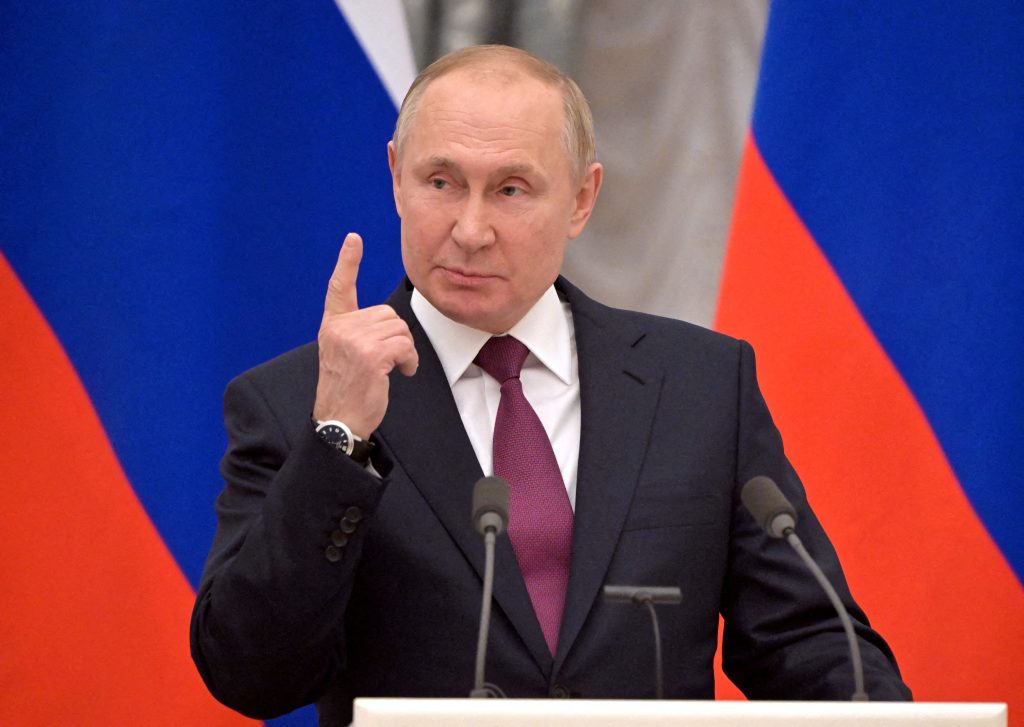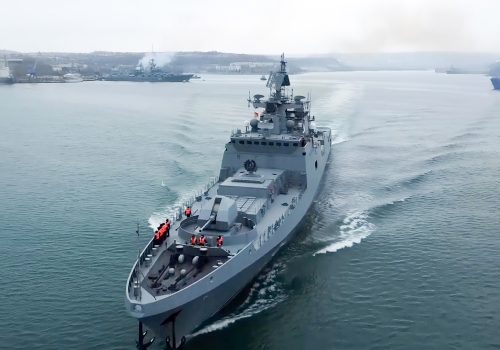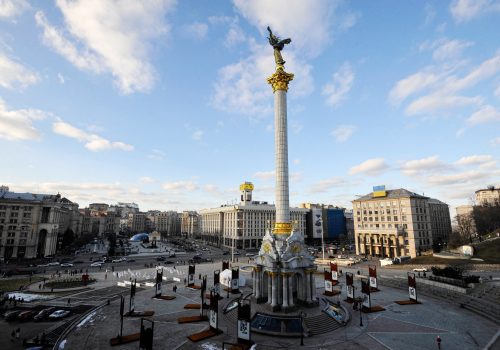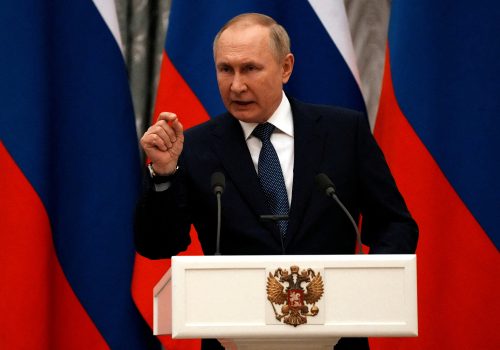The looming threat of a Russian offensive against Ukraine raises the question: what would constitute a Russian victory in any future military operation? The British government has suggested that Moscow’s goal is to install a puppet regime in Kyiv. But could Russia win by achieving more limited military objectives?
Ever since Putin first came to power more than two decades ago, his top foreign policy goal has been the subjugation of Ukraine. This is an indispensable element of Putin’s own imperial restoration project and reflects widespread feelings of resentment in Moscow over the perceived injustice of the post-1991 settlement.
Ukraine is the chief symbol of this injustice. The country’s cultural closeness, large Russian-speaking population, and central role in Russia’s own national narrative mean that many Russians still struggle to accept the entire notion of Ukraine as a separate and sovereign state. Meanwhile, post-Soviet Ukraine’s embrace of democracy is viewed as a threat by the Kremlin and the country’s Euro-Atlantic ambitions are widely perceived as a betrayal.
Putin himself is a leading proponent of such revisionist thinking regarding Ukraine. He has frequently lamented the post-1991 “break-up of historical Russia” and published an entire treatise in summer 2021 arguing that Ukraine was an illegitimate state shaped “on the lands of historical Russia.”
Stay updated
As the world watches the Russian invasion of Ukraine unfold, UkraineAlert delivers the best Atlantic Council expert insight and analysis on Ukraine twice a week directly to your inbox.
We are currently witnessing what may be the final and most dramatic stage of Putin’s long campaign to reassert Russian authority over Ukraine. Prior to massing troops along the Ukrainian border and threatening a full-scale invasion, Putin had already tried a wide range of other tactics.
Throughout the first two decades of the post-Soviet era, the Kremlin sought to dominate Ukraine through a combination of political, business, soft power, and media influence. When this failed to deter Ukrainians from seeking closer ties with the European Union, Moscow directly pressured President Yanukovych in late 2013 to abandon a planned EU-Ukraine Association Agreement and realign the country with Russia.
This intervention ultimately backfired when Ukrainians rose up in opposition to the country’s U-turn away from Europe. The revolution of 2013-2014 made it painfully clear to Moscow that Ukraine could not be brought back under Russian domination merely through political influence operations.
Following the collapse of the Yanukovych regime, Russia launched a covert war with the aim of breaking Ukraine apart from within. Directly after the Russian occupation of Crimea in March 2014, Russia attempted to orchestrate pro-Kremlin uprisings in eight Ukrainian provinces representing roughly half of the country. This ploy did not work due to unexpectedly strong local opposition.
Moscow’s only partial successes came in Donetsk and Luhansk provinces, collectively known as the Donbas region. Even in the Donbas, Kremlin-coordinated uprisings were contained and almost defeated by Ukrainian forces until the Russian military intervened in August and early September 2014.
After political manipulations and covert war successively failed to bring Ukraine under Moscow’s sway, Russia attempted to use the occupied part of the Donbas as an anchor to drag the rest of Ukraine back into the Russian sphere. However, Ukraine has refused to implement a Kremlin-friendly interpretation of the 2015 Minsk Accords despite Moscow’s multiple diplomatic offensives.
In parallel with diplomatic efforts, Russia has also been actively preparing its military for a potential major war against Ukraine. By early 2021, the diplomatic and military paths had both arrived at a crossroads. It was clear that Moscow could not force Ukraine to accept a disastrous peace deal via diplomacy alone. At the same time, Russian preparations had progressed to the stage that a full-scale offensive against Ukraine was militarily feasible.
Today’s intensifying Russian military encirclement of Ukraine serves two purposes. It is an attempt to intimidate Ukraine into diplomatic surrender. Failing this, it gives Putin the option of rapidly launching a major military offensive should he decide to do so.
Eurasia Center events

There is no doubt that any new Russian invasion would face fierce Ukrainian resistance. Ukrainian national identity has been dramatically strengthened by eight years of undeclared war with Russia. Recent polls indicate that millions would be prepared to actively oppose a Russian offensive.
Aside from installing a proxy regime in Kyiv, the only practical route to victory open to Russia would be the seizure of an anchor region much larger than the currently occupied parts of the Donbas. This would allow Moscow to dictate its terms to Kyiv. Russian demands would center on Ukrainian membership of Moscow’s Eurasian geopolitical project and an end to Ukraine’s Euro-Atlantic ambitions.
To achieve this, Russia needs first to conquer a large portion of Ukraine and then to stabilize this occupation. Ukraine, and everyone who tries to help her, must deny Moscow these two achievements if Ukrainian sovereignty is to survive the ordeal.
If Russia does succeed in seizing large parts of the country, Ukrainians will face a stark choice. A ceasefire would mitigate what would be an unfolding humanitarian catastrophe, but it would also mean the end of Ukrainian statehood.
The alternative choice for Ukraine would be to continue military resistance. The human toll of a prolonged conflict would be immense. Foreign military aid would flow to the Ukrainians. Russia would be faced with painful economic consequences along with mounting casualties. Unlike Ukrainians defending their homes, Russians would wonder what they were fighting for. It is far from clear how long the Kremlin would be able to sustain such a situation.
Ukraine is not a NATO member and Ukrainians know that if Russia does attack, it will be up to them alone to save their sovereignty. The least foreign friends and partners can do is arm Ukraine and provide Ukrainians with maximum support as they prepare for the daunting task ahead.
David Batashvili is a Research Fellow at the Georgian Foundation for Strategic and International Studies (Rondeli Foundation) in Tbilisi, Georgia.
Further reading
The views expressed in UkraineAlert are solely those of the authors and do not necessarily reflect the views of the Atlantic Council, its staff, or its supporters.

The Eurasia Center’s mission is to enhance transatlantic cooperation in promoting stability, democratic values and prosperity in Eurasia, from Eastern Europe and Turkey in the West to the Caucasus, Russia and Central Asia in the East.
Follow us on social media
and support our work
Image: Russian President Vladimir Putin gestures during a joint news conference with German Chancellor Olaf Scholz in Moscow. February 15, 2022. (Sputnik/Sergey Guneev/Pool via REUTERS)




